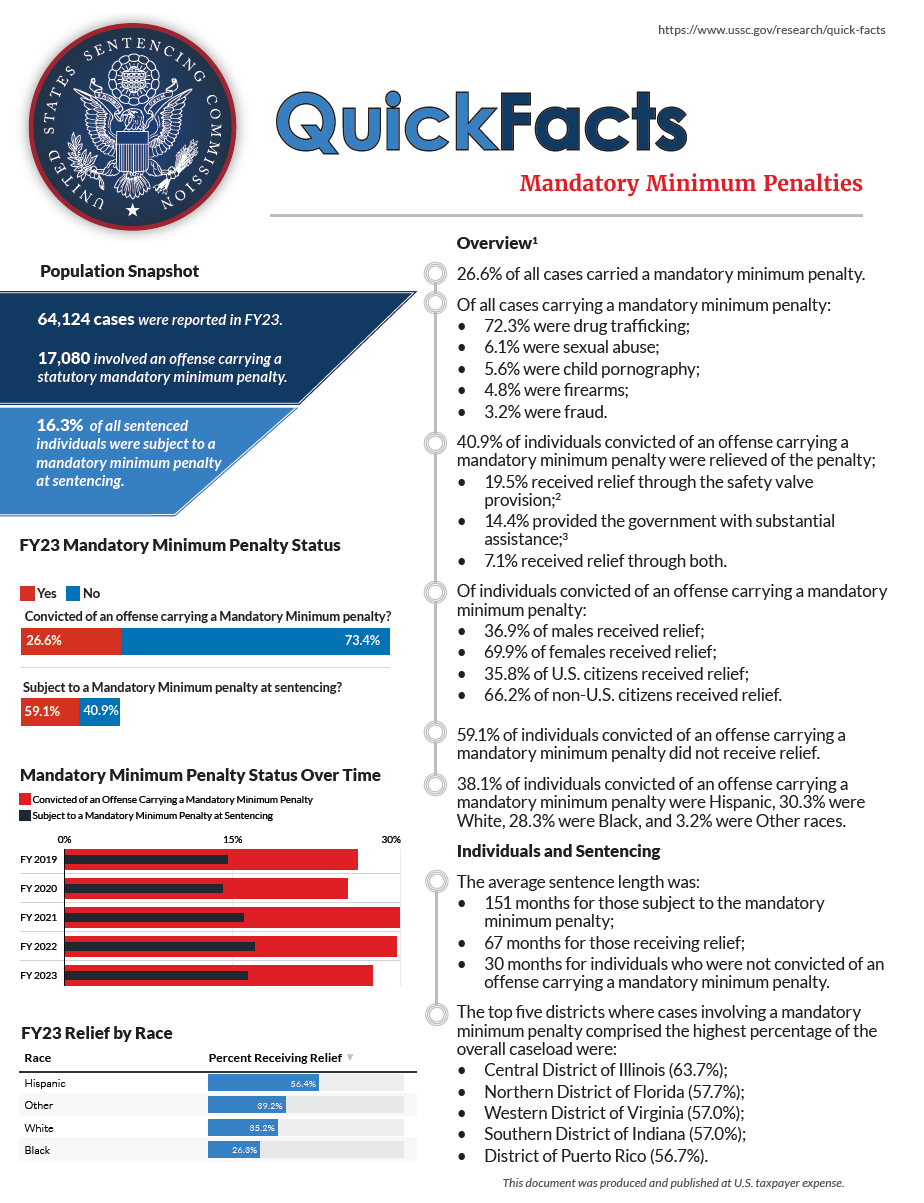Of the 61,678 cases reported to the Commission in fiscal year 2024, 14,964 involved an offense carrying a statutory mandatory minimum penalty.1 15.9% of all sentenced individuals were subject to a mandatory minimum penalty at sentencing.
Click the cover for the PDF handout or learn more below.
Overview
- 24.3% of all cases carried a mandatory minimum penalty.
- Of all cases carrying a mandatory minimum penalty:
- 69.4% were drug trafficking;
- 7.4% were sexual abuse;
- 6.2% were child pornography;
- 5.0% were firearms;
- 3.4% were fraud.
- 37.0% of individuals convicted of an offense carrying a mandatory minimum penalty were relieved of the penalty;
- 16.1% received relief through the safety valve provision;2
- 14.6% provided the government with substantial assistance;3
- 6.3% received relief through both.
- Of individuals convicted of an offense carrying a mandatory minimum penalty:
- 34.0% of males received relief;
- 63.7% of females received relief;
- 31.1% of U.S. citizens received relief;
- 64.1% of non-U.S. citizens received relief.
- 63.0% of individuals convicted of an offense carrying a mandatory minimum penalty did not receive relief.
- 38.1% of individuals convicted of an offense carrying a mandatory minimum penalty were Hispanic, 29.5% were Black, 28.5% were White, and 3.9% were Other races.
Individuals and Sentencing
- The average sentence length was:
- 157 months for those subject to the mandatory minimum penalty;
- 70 months for those receiving relief;
- 31 months for individuals who were not convicted of an offense carrying a mandatory minimum penalty.
- The top five districts where cases involving a mandatory minimum penalty comprised the highest percentage of the overall caseload were:
- District of Hawaii (72.9%);
- Southern District of Indiana (62.5%);
- District of Puerto Rico (59.3%);
- Northern District of Florida (58.7%);
- District of Nebraska (55.7%).
Offense Categories
Identity Theft Offenses
- 83.8% of the 567 individuals sentenced for identity theft offenses4 were subject to a mandatory minimum penalty at sentencing.
- Their average sentence was 59 months; 31 months with relief.
Drug Offenses
- 57.2% of the 17,858 individuals sentenced for drug offenses5 were convicted of an offense carrying a mandatory minimum penalty;
- 52.4% remained subject to that penalty at sentencing.
- Their average sentence was 142 months; 68 months with relief.
- 66.9% of the 3,456 individuals sentenced for powder cocaine offenses were convicted of an offense carrying a mandatory
minimum penalty, compared to 49.6% of individuals sentenced for marijuana offenses.
- 75.6% of the 238 individuals sentenced for crack cocaine offenses remained subject to a mandatory minimum penalty at sentencing, compared to 38.4% of individuals sentenced for marijuana offenses.
Firearms Offenses
- 27.6% of the 10,184 individuals sentenced for firearms offenses were convicted of an offense carrying a mandatory minimum penalty.
- 2,522 were convicted under 18 U.S.C. § 924(c);
- 81.3% remained subject to the mandatory minimum penalty at sentencing.
- Their average sentence was 161 months; 102 months with relief.
- 194 qualified as Armed Career Criminals under 18 U.S.C. § 924(e);
- 83.4% remained subject to the mandatory minimum penalty at sentencing.
- Their average sentence was 214 months; 122 months with relief.
Sex Offenses
- 72.0% of the 2,779 individuals sentenced for sex offenses—sexual abuse or child pornography—were convicted of an offense carrying a mandatory minimum penalty.
- 76.8% of the 1,413 individuals sentenced for sexual abuse were convicted of an offense carrying a mandatory minimum penalty;
- 95.6% remained subject to the mandatory minimum penalty at sentencing.
- Their average sentence was 262 months; 159 months with relief.
- 67.1% of the 1,366 individuals sentenced for child pornography were convicted of an offense carrying a mandatory minimum penalty;
- 97.6% remained subject to the mandatory minimum penalty at sentencing.
- Their average sentence was 144 months; 99 months with relief.
1 Cases with incomplete sentencing information were excluded from the analysis.
2 See 18 U.S.C. § 3553(f).
3 See 18 U.S.C. § 3553(e).
4 Convicted of an offense under 18 U.S.C. § 1028A.
5 The ‘Fentanyl’ category includes both Fentanyl (N-phenyl-N-[1-(2-phenylethyl)-4-piperidinyl] Propanamide) and Fentanyl Analogue.
SOURCE: United States Sentencing Commission, FY 2020 through FY 2024 Datafiles, USSCFY20-USSCFY24.

